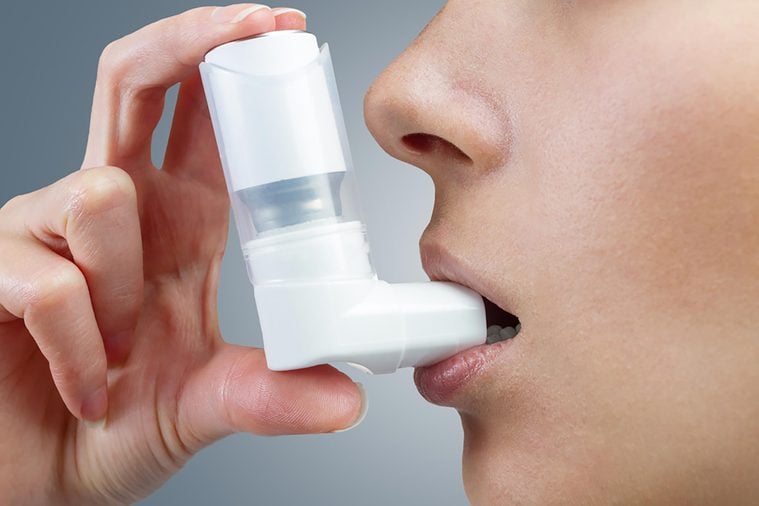The Scary Side Effect of Using Inhalers You Need to Know About
Updated: Oct. 05, 2017
If you're an older adult, and you use an inhaler to deal with asthma or COPD, you may be putting yourself at risk for this scary infection, according to science.
 Using inhalers to deliver steroids (to deal with lung conditions) has long been associated with impairing the immune system’s ability to fight lung infections. Earlier this year, a study specifically tied inhaler use by young asthma patients under 35 years of age to an increased risk of pneumonia. Now, a brand new study suggests that inhaler use by older asthma and COPD patients could raise the risk of another serious lung infection—a type of tuberculosis that is notoriously difficult to treat and resistant to a number of common antibiotics.
Using inhalers to deliver steroids (to deal with lung conditions) has long been associated with impairing the immune system’s ability to fight lung infections. Earlier this year, a study specifically tied inhaler use by young asthma patients under 35 years of age to an increased risk of pneumonia. Now, a brand new study suggests that inhaler use by older asthma and COPD patients could raise the risk of another serious lung infection—a type of tuberculosis that is notoriously difficult to treat and resistant to a number of common antibiotics.
The study, which was published in the academic journal, the European Respiratory Journal, was led by Sarah Brode, PhD, assistant professor of medicine at the University of Toronto, Canada. Using existing data collected on 417,494 people aged 66 and older in Ontario, Canada, Dr. Brode’s team discovered that people who had been prescribed inhaled corticosteroids for the treatment of either asthma or COPD experienced 2,966 cases of nontuberculous myocobacteria (NTB). The association was particularly strong in patients who were using the corticosteroid fluticasone, an ingredient in the allergy medication, Flonase. The risk seemed to be lower for patients using the corticosteroid, budesonide.
All told, the chances of contracting NTB were twice as high for elderly people who were using inhalers; the longer they used the inhaler, the greater their risk. Since NBT can be debilitating—and even fatal—Dr. Brode and her team of researchers believe that the time is ripe for clinicians to reconsider the use of inhalers in some patients—particularly older patients with COPD.
“Steroid inhalers are critical treatments for managing asthma symptoms,” Dr. Brode told EurekAlert, but “they are less important in the management of COPD.” She suggests that inhalers may not actually be the best treatment for COPD patients, particularly those that have already had an inhaler-related infection and may be more prone to them. Dr. Brode hopes that clinicians will use the information from the study to reconsider the potential benefits versus harms associated with the use of steroid inhalers.
Patients who are currently using an inhaler should discuss the benefits and risks with their clinicians. In the meantime, Dr. Brode and her colleagues are continuing to study the same group of patients to determine what treatments might work best for those diagnosed with NTB.
Did you know that asthma could be made more manageable through dietary changes?











